Supreme Court Sets Aside High Court Judgment for Procedural Violations in Second Appeal
The case of Nek Pal & Ors. vs. Nagar Palika Parishad & Ors. revolves around the procedural lapses in the hearing of a second appeal under Section 100 of the Code of Civil Procedure (CPC). The Supreme Court set aside the High Court’s judgment due to the failure to frame substantial questions of law before deciding the appeal. This ruling emphasizes the necessity of adhering to procedural requirements for fair hearings in second appeals.
Background of the Case
The dispute involved the alleged illegal transfer of a property claimed to be of religious and charitable nature. The matter reached the High Court of Uttarakhand through second appeals filed by the appellants against concurrent findings of the lower courts. The High Court, instead of framing substantial questions of law at the time of admission, formulated them during the final hearing without prior notice to the parties.
The appellants challenged the High Court’s approach before the Supreme Court, arguing that the procedure adopted was contrary to the mandatory provisions of Section 100 CPC.
Petitioner’s Arguments
The appellants contended:
- The High Court failed to frame substantial questions of law at the time of admitting the appeal, violating Section 100 CPC.
- The appeal was decided on legal questions formulated for the first time during the final hearing, denying the parties a fair opportunity to argue.
- The High Court’s process of hearing and deciding the appeal without prior notification of the legal questions was arbitrary and illegal.
- Second appeals cannot be decided without properly identifying the legal issues requiring adjudication.
Respondent’s Arguments
The respondents countered:
- The High Court had the authority to frame substantial questions of law at any stage of the appeal proceedings.
- The parties had sufficient opportunity to argue on the legal issues raised during the final hearing.
- Even if there was a procedural lapse, it did not materially affect the outcome of the case.
Supreme Court’s Observations
The Supreme Court examined the procedural errors in the High Court’s handling of the appeal and held:
“The act of finally hearing a second appeal without framing any substantial question of law is itself illegal. The High Court should have formulated the substantial questions of law at the time of admission or at least provided an opportunity to the parties to argue based on those questions before the final hearing.”
The Court further noted:
“The High Court did not put the rival Advocates to notice before the commencement of hearing that it was proposing to hear the appeal on specific substantial questions of law. The High Court could have framed substantial questions of law and heard the appeal after a few days so that the Advocates had notice.”
Final Verdict
The Supreme Court ruled:
“The procedure followed by the High Court is completely illegal and contrary to Section 100 of CPC. The impugned judgment is set aside, and the second appeal is restored to the file of the High Court for fresh adjudication in accordance with law.”
The Court directed the High Court to frame substantial questions of law and provide an opportunity to both parties to argue accordingly.
Implications of the Judgment
This ruling reinforces key procedural principles for second appeals:
- Mandatory Framing of Substantial Questions of Law: Second appeals cannot be decided without identifying and notifying legal issues in advance.
- Fair Hearing Rights: Parties must be given sufficient notice and opportunity to argue on the framed questions.
- High Court’s Duty: The High Court must ensure compliance with procedural law to prevent arbitrary adjudication.
- Restoration of Procedural Integrity: Improperly decided appeals can be set aside and remanded for correct adjudication.
Conclusion
The Supreme Court’s decision in this case underscores the necessity of procedural compliance in second appeals. By setting aside the High Court’s judgment due to its failure to follow the correct process under Section 100 CPC, the ruling upholds the fundamental principles of fair trial and due process.
Petitioner Name: Nek Pal & Ors..Respondent Name: Nagar Palika Parishad & Ors..Judgment By: Justice Abhay S. Oka, Justice Augustine George Masih.Place Of Incident: Uttarakhand.Judgment Date: 26-07-2024.
Don’t miss out on the full details! Download the complete judgment in PDF format below and gain valuable insights instantly!
Download Judgment: nek-pal-&-ors.-vs-nagar-palika-parisha-supreme-court-of-india-judgment-dated-26-07-2024.pdf
Directly Download Judgment: Directly download this Judgment
See all petitions in Contract Disputes
See all petitions in Property Disputes
See all petitions in Succession and Wills
See all petitions in Specific Performance
See all petitions in Landlord-Tenant Disputes
See all petitions in Judgment by Abhay S. Oka
See all petitions in Judgment by Augustine George Masih
See all petitions in allowed
See all petitions in Remanded
See all petitions in supreme court of India judgments July 2024
See all petitions in 2024 judgments
See all posts in Civil Cases Category
See all allowed petitions in Civil Cases Category
See all Dismissed petitions in Civil Cases Category
See all partially allowed petitions in Civil Cases Category







